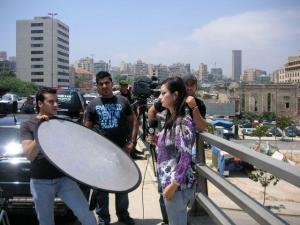
Shockingly, the Lebanese leaders seem to have agreed and the most symbolic evidence of this is the end of the opposition’s tent city, which stifled the economy of Beirut’s posh downtown district for the last 17 months. As soon as the decision was announced, a horde of journalists descended upon the area, which had been virtually off limits to the press since 2006.

But though the opposition seems to handle crises well, they didn’t seem to be prepared for a stampede of journalists. After about 20 minutes of a free-for-all, they began stopping us from filming (see man pointing at me in center).

For some reason, they didn’t really want to share this scene with the rest of the world, but that proved difficult to enforce in the middle of the city, and journalists continued filming from the highway overpass, where they set up live shots and parked their satellite trucks.


As is usually the case in these acts of civil disobedience, Sukleen, the city’s garbage company, was called in to help clean up the political mess.
 But opposition campers asked them to cease and desist when they touched their refrigerators.
But opposition campers asked them to cease and desist when they touched their refrigerators.
 It appears the fridge was a “khat ahmar” or red line and the garbage collectors were asked to move on.
It appears the fridge was a “khat ahmar” or red line and the garbage collectors were asked to move on.
 In the end however, it seemed to be a happy day for everyone, with many average Lebanese coming back downtown for the first time in months.
In the end however, it seemed to be a happy day for everyone, with many average Lebanese coming back downtown for the first time in months.

And with optimism in the air, shops restaurants that had been closed for over a year, began scrubbing down their dust-caked windows.
 I overheard the manager of an Italian restaurant ordering spaghetti and new uniforms as he stood outside talking to a supplier. You’ve got to hand it to these shop owners, after sustaining nearly two years in lost revenue, they are ready to reopen in a couple of hours notice.
I overheard the manager of an Italian restaurant ordering spaghetti and new uniforms as he stood outside talking to a supplier. You’ve got to hand it to these shop owners, after sustaining nearly two years in lost revenue, they are ready to reopen in a couple of hours notice.
And even in the tent city, despite its cardboard shanty town look, the young activists still retained a sense of style, as seen here in this makeshift espresso stand, dedicated to the resistance.





